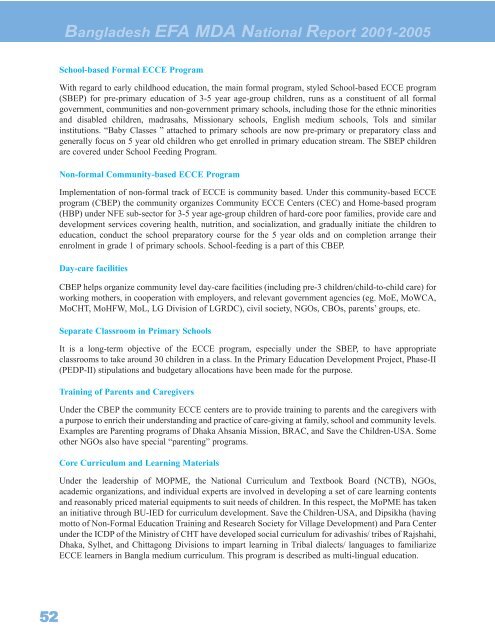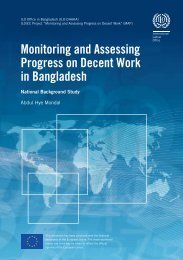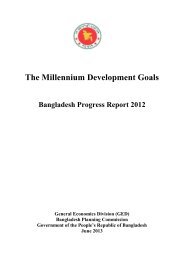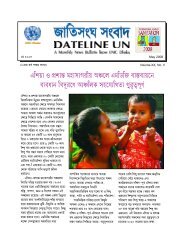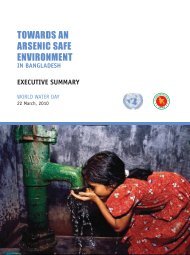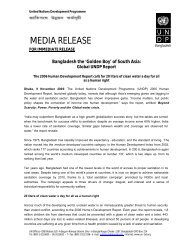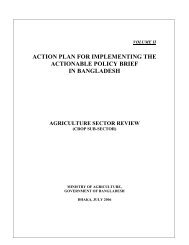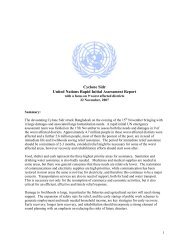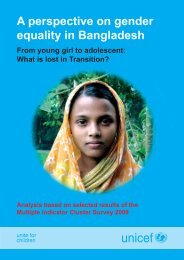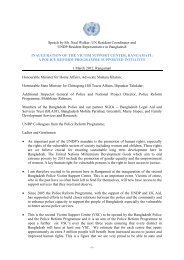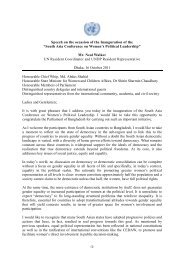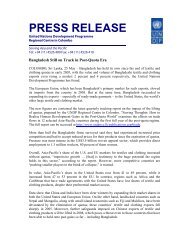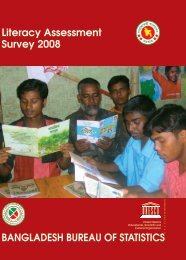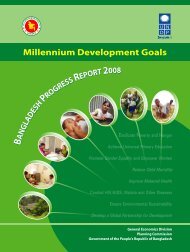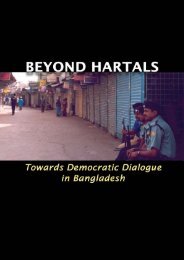Bangladesh EFA MDA National Report 2001-2005 - United Nations ...
Bangladesh EFA MDA National Report 2001-2005 - United Nations ...
Bangladesh EFA MDA National Report 2001-2005 - United Nations ...
You also want an ePaper? Increase the reach of your titles
YUMPU automatically turns print PDFs into web optimized ePapers that Google loves.
<strong>Bangladesh</strong> <strong>EFA</strong> <strong>MDA</strong> <strong>National</strong> <strong>Report</strong> <strong>2001</strong>-<strong>2005</strong>School-based Formal ECCE ProgramWith regard to early childhood education, the main formal program, styled School-based ECCE program(SBEP) for pre-primary education of 3-5 year age-group children, runs as a constituent of all formalgovernment, communities and non-government primary schools, including those for the ethnic minoritiesand disabled children, madrasahs, Missionary schools, English medium schools, Tols and similarinstitutions. “Baby Classes ” attached to primary schools are now pre-primary or preparatory class andgenerally focus on 5 year old children who get enrolled in primary education stream. The SBEP childrenare covered under School Feeding Program.Non-formal Community-based ECCE ProgramImplementation of non-formal track of ECCE is community based. Under this community-based ECCEprogram (CBEP) the community organizes Community ECCE Centers (CEC) and Home-based program(HBP) under NFE sub-sector for 3-5 year age-group children of hard-core poor families, provide care anddevelopment services covering health, nutrition, and socialization, and gradually initiate the children toeducation, conduct the school preparatory course for the 5 year olds and on completion arrange theirenrolment in grade 1 of primary schools. School-feeding is a part of this CBEP.Day-care facilitiesCBEP helps organize community level day-care facilities (including pre-3 children/child-to-child care) forworking mothers, in cooperation with employers, and relevant government agencies (eg. MoE, MoWCA,MoCHT, MoHFW, MoL, LG Division of LGRDC), civil society, NGOs, CBOs, parents’ groups, etc.Separate Classroom in Primary SchoolsIt is a long-term objective of the ECCE program, especially under the SBEP, to have appropriateclassrooms to take around 30 children in a class. In the Primary Education Development Project, Phase-II(PEDP-II) stipulations and budgetary allocations have been made for the purpose.Training of Parents and CaregiversUnder the CBEP the community ECCE centers are to provide training to parents and the caregivers witha purpose to enrich their understanding and practice of care-giving at family, school and community levels.Examples are Parenting programs of Dhaka Ahsania Mission, BRAC, and Save the Children-USA. Someother NGOs also have special “parenting” programs.Core Curriculum and Learning MaterialsUnder the leadership of MOPME, the <strong>National</strong> Curriculum and Textbook Board (NCTB), NGOs,academic organizations, and individual experts are involved in developing a set of care learning contentsand reasonably priced material equipments to suit needs of children. In this respect, the MoPME has takenan initiative through BU-IED for curriculum development. Save the Children-USA, and Dipsikha (havingmotto of Non-Formal Education Training and Research Society for Village Development) and Para Centerunder the ICDP of the Ministry of CHT have developed social curriculum for adivashis/ tribes of Rajshahi,Dhaka, Sylhet, and Chittagong Divisions to impart learning in Tribal dialects/ languages to familiarizeECCE learners in Bangla medium curriculum. This program is described as multi-lingual education.52


